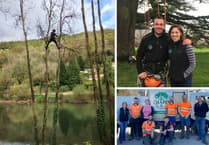Survival expert, Ray Mears, told the crowds gathered for the Violette Szabo memorial that young people today could learn a lot from the example set by this heroine of the Special Operations Executive (SOE) in World War II.
Mr Mears was a special guest at the celebration for Violette’s life at the Museum at Wormelow. He said that it was an honour and a privilege to attend the event, which is organised by Rosemary Rigby, who runs the museum at the house where Violette spent time as a child.
Mr Mears visited the museum about 18 months ago before embarking on a lecture tour in which Violette had a starring role. He said that he first became aware of the incredible bravery and skill of those individuals working for the SOE when he was combining his work teaching survival skills with photography.
He was invited to a reunion event with members of the SOE and he revealed that he was really impressed by the extraordinary network of people who had done such amazing things for the nation. He said they were also aware of the importance of keeping secrets, which in the days of social media and wikileaks was worth remembering.
He talked about the state of the art training the wireless operatives received and how hard everyone worked as they knew lives depended on them.
Sean Rehling, curator at the Imperial War Museum gave details of Violette’s life and her experience and training in the SOE. He said she was a crack shot and was probably recruited due to her fluency in French.
He added that it is well documented that she loved her holidays spent at Cartref, Wormelow where she stayed with her cousins.
Tania Szabo, Violette’s daughter also spoke about her mother and gave many personal glimpses into her life and personality from stories she has heard from family members, and those who worked with her. She said Violette had four brothers and was well able to take care of herself.
The guests who had joined the memorial day were also entertained by Ruby Ann who sang Happy Birthday to Violette as well as several popular songs from the war years, including the There’ll be Blue Birds over the White Cliffs of Dover and We’ll Meet Again.
Read the full article in this week’s edition of the Ross Gazette.




